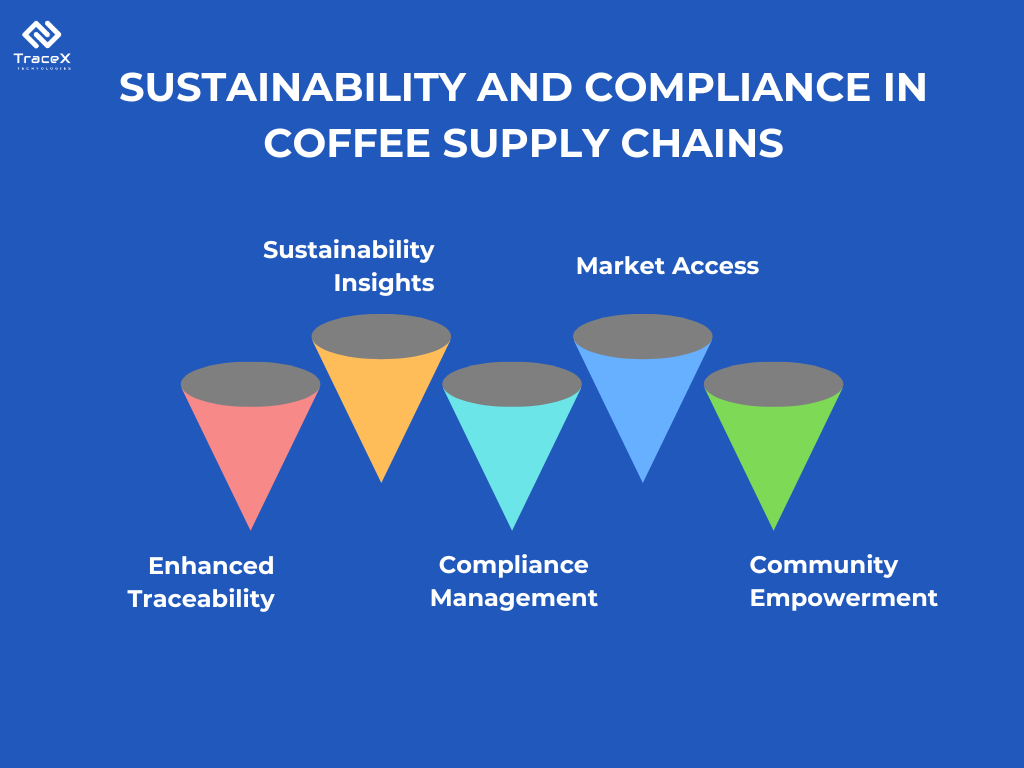Contact: +91 99725 24322 |
Menu
Menu
Quick summary: Discover the key challenges in the Ethiopian coffee sector, from traceability gaps to EUDR compliance risks. Learn how exporters can overcome global market pressures and secure sustainable, profitable EU contracts.

Ethiopia, the birthplace of coffee, is renowned for its rich flavors and heritage beans that fuel specialty markets worldwide. But behind every fragrant cup lies a complex web of challenges threatening the sector’s future. From fragmented supply chains and unpredictable climate impacts to increasing compliance demands like the EUDR (EU Deforestation Regulation)—Ethiopian coffee exporters, cooperatives, and smallholder farmers face mounting pressure.
According to USDA, Ethiopia is Africa’s largest coffee producer and the world’s fifth largest exporter of Arabica coffee. Coffee is Ethiopia’s number one source of export revenue generating about 30-35 percent of the country’s total export earnings.
Without digital traceability and supply chain transparency, these iconic beans risk losing access to premium EU markets. For stakeholders relying on coffee for livelihoods, the stakes have never been higher. Can Ethiopia’s coffee sector rise to meet global compliance and sustainability demands—or will market access slip through its fingers?
Ethiopia’s coffee sector is predominantly smallholder-driven, with over 95% of production coming from farms smaller than one hectare. These farmers face significant challenges, including low yields averaging 200-250 kg per hectare.
While Africa, including Ethiopia, is a major coffee producer, the region’s share of the global coffee value chain has declined due to factors like low productivity, poor quality, and limited market access. Revitalizing the coffee sector is crucial for economic growth and development in these countries.
Ethiopian coffee farmers are increasingly experiencing the adverse effects of climate change. Rising temperatures, unpredictable rainfall patterns, and extreme weather events are altering the coffee-growing regions’ microclimates, making it difficult to sustain coffee production. These changes affect the quality and yield of coffee beans, threatening the livelihoods of millions of smallholder farmers.
Deforestation and land degradation exacerbate the environmental challenges in Ethiopia. Coffee is traditionally grown under the shade of forests, which helps maintain the ecosystem’s balance. However, deforestation for agricultural expansion and fuelwood has led to significant habitat loss, soil erosion, and biodiversity decline. These environmental issues not only reduce coffee productivity but also undermine the sustainability of coffee farming.
To mitigate the impact of climate change and environmental degradation, several strategies can be implemented:
Ethiopian coffee farmers often face significant economic challenges due to the volatility of coffee prices in the international market. The fluctuating prices make it difficult for farmers to predict their income and invest in improving their farming practices. Additionally, low coffee prices frequently do not cover the cost of production, leading to financial hardships for smallholder farmers.
Access to finance is a critical issue for Ethiopian coffee farmers. Many farmers lack the necessary financial resources to invest in modern farming techniques, inputs, and infrastructure. Without adequate financing, they are unable to improve their productivity and quality, which limits their ability to compete in the global market.
Addressing economic constraints and improving market access require a multifaceted approach:
The Ethiopian coffee sector faces labor shortages due to the migration of young people to urban areas in search of better opportunities. This migration results in an aging farming population, which poses challenges for the future sustainability of coffee farming.
Many workers in the coffee sector endure poor working conditions, including low wages, lack of social protection, and limited access to healthcare and education. These conditions affect the well-being of workers and their families, leading to social and economic instability.
Improving social and labor conditions in the Ethiopian coffee sector requires concerted efforts from various stakeholders:
Navigating global market demands as a coffee exporter from Ethiopia isn’t just about delivering quality beans anymore. Today’s buyers, especially those in Europe, are looking way beyond taste and aroma. They’re asking tough questions: Where exactly was this coffee grown? Can you prove it didn’t come from deforested land? Is your entire supply chain sustainable and compliant?
And that’s where it gets tricky. With the EU Deforestation Regulation (EUDR) now in play, simply having a great product isn’t enough. If you can’t show GPS coordinates for your farms or trace your coffee back to its exact origin, you risk losing out—big time. We’ve seen exporters lose lucrative EU contracts because their paperwork was incomplete or their geolocation data didn’t hold up under scrutiny.
On top of that, many buyers are layering in their own expectations—Organic, Fairtrade, Rainforest Alliance certifications—each with different reporting requirements. Suddenly, what used to be a simple export deal turns into a complex compliance exercise.
Here’s the thing: The market is rewarding those who get this right. Exporters who’ve invested in digital traceability platforms are finding it easier to win premium buyers. Why? Because they can pull up real-time data, show their sourcing is clean, and meet every certification demand—without scrambling at the last minute.
If you’re an Ethiopian coffee exporter wondering how to stay competitive, the writing’s on the wall—traceability and compliance are now your tickets to market access, not optional extras.
Ethiopian coffee exporters don’t have to fall behind. Technology is already changing the game for forward-thinking players in the coffee sector, making EUDR compliance and global competitiveness much more achievable.
Imagine this: instead of flipping through paper records, a coffee exporter logs into a digital traceability platform and instantly sees where every coffee cherry came from — right down to the farm, mapped with GPS. That’s farm-to-export visibility at their fingertips. Not only does this build trust with EU buyers, but it also unlocks premium prices for verified, traceable coffee.
Take it a step further — with satellite-powered deforestation checks, exporters no longer have to guess if a farm’s land-use history is EUDR-compliant. AI-driven tools scan and flag risks in real-time, helping exporters fix issues before they cost them a contract.
I’ve seen exporters struggle for months, losing EU buyers because they couldn’t prove their supply chain was clean. Then, one smart move — adopting a coffee traceability software — flipped the story. Not only did they secure that EU contract, but they also started attracting new buyers who valued transparency.
It’s simple: technology isn’t optional anymore — it’s the bridge between Ethiopia’s rich coffee heritage and a future where sustainability and traceability open doors to global markets.

The TraceX EUDR Compliance Platform is a powerful, end-to-end digital solution designed to help agribusinesses, exporters, and supply chain stakeholders seamlessly comply with the European Union Deforestation Regulation (EUDR).
A leading Nigerian trading firm specializing in premium cocoa beans and cashew nuts transformed its operations with TraceX. By implementing TraceX’s EUDR platform, the firm significantly enhanced data accuracy, streamlined processes, and achieved complete supply chain traceability.
Key achievements:
This success story highlights the transformative power of TraceX in empowering businesses to achieve excellence in supply chain management and sustainability.
The Ethiopian coffee sector holds immense potential to contribute to the country’s economic growth and rural development. However, addressing the challenges of climate change, economic constraints, social and labor issues, and regulatory barriers is essential for realizing this potential. By implementing sustainable practices, improving market access, enhancing social conditions, and streamlining regulatory frameworks, Ethiopia can build a resilient and competitive coffee sector that benefits farmers, communities, and the environment.
Through collaborative efforts from government, industry stakeholders, and international partners, the Ethiopian coffee sector can overcome these challenges and continue to thrive as a global leader in coffee production.
Ethiopia’s coffee sector relies heavily on smallholder farmers with limited digital infrastructure, making it difficult to collect farm-level geolocation data required for traceability and EUDR compliance.
The EUDR demands deforestation-free coffee with GPS farm mapping. Without proving traceability, Ethiopian exporters risk losing access to the EU market—one of their largest buyers.
Digital traceability platforms, satellite monitoring, and AI-driven risk assessment tools can help exporters map farms, monitor deforestation risks, and generate EUDR-compliant reports, protecting market access and building buyer trust.
